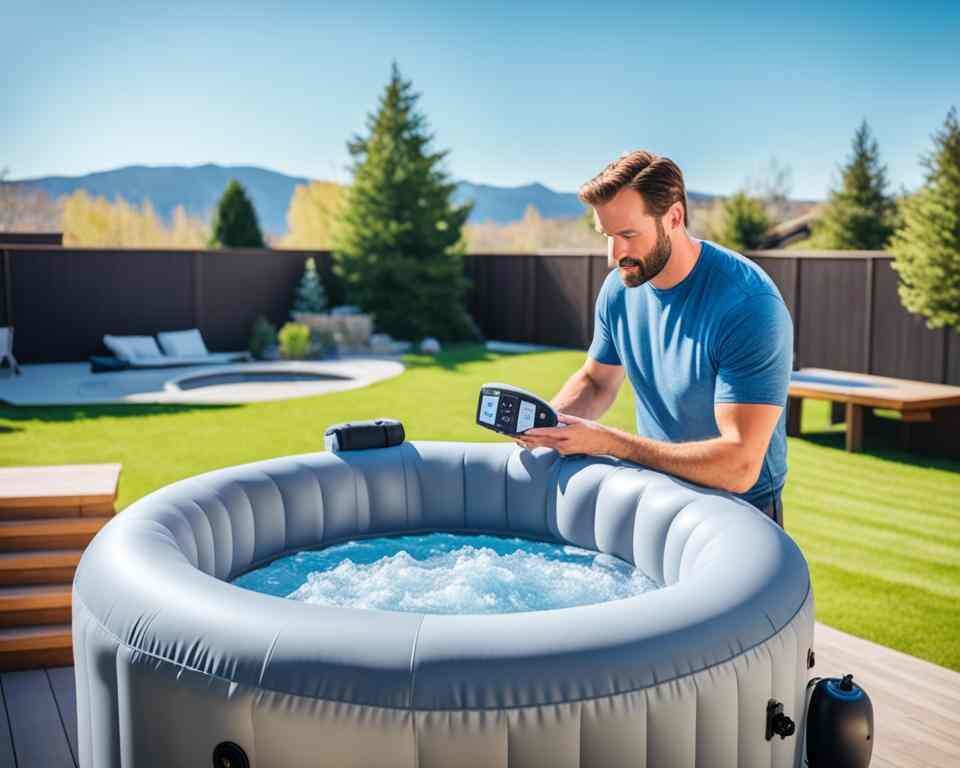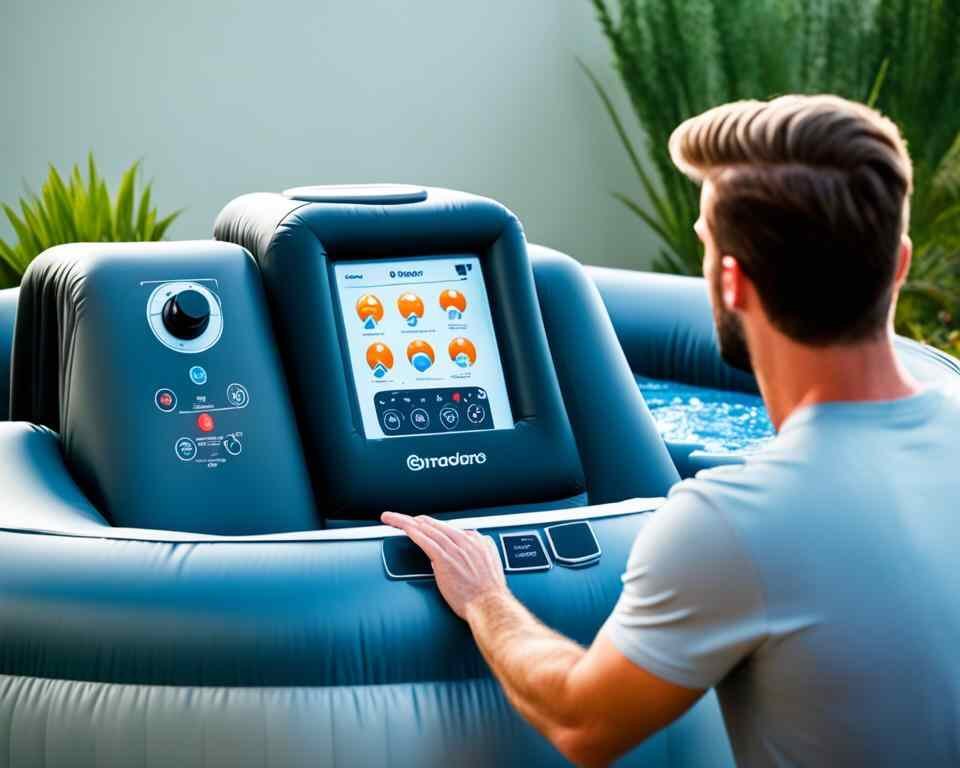Are you frustrated with your hot tub’s slow heating? Do you find yourself waiting and waiting for it to warm up, only to be left disappointed? Well, you’re not alone. Many hot tub owners experience this issue and wonder why it takes so long for their hot tubs to heat up. But fear not, because in this article, we’re going to uncover the reasons behind slow hot tub heating and provide you with valuable insights on how to tackle this problem.
From thermostat malfunctions to inefficient hot tub covers, several factors can contribute to slow heating. By understanding these causes and implementing the right solutions, you can get your hot tub up to the perfect temperature in no time. So, let’s dive right in and discover why your hot tub may be taking forever to heat up.
Key Takeaways:
- There are several common causes for slow hot tub heating.
- Thermostat malfunctions and inefficient hot tub covers can hinder heating efficiency.
- Low outside temperatures and spa heater failures can also impact the heating process.
- Issues with temperature sensors, insufficient water levels, and clogged filters can contribute to slow heating.
- Maintaining and troubleshooting your hot tub regularly is crucial for optimal heating performance.

Why is my hot tub taking forever to heat up?
When your hot tub is taking an unusually long time to heat up, it can be frustrating and inconvenient. Understanding the reasons behind this issue can help you identify the problem and implement the necessary solutions. In this section, we’ll discuss why your hot tub might be taking forever to heat up and provide insights on how to improve its heating efficiency.
There can be various factors that contribute to the slow heating of your hot tub. It’s essential to consider these factors and take appropriate measures to enhance the heating efficiency of your hot tub.
One common reason for slow hot tub heating is improper hot tub heat uptime. If your hot tub is not heating up within a reasonable time frame, it could signify an underlying heating problem that needs to be addressed.
Another potential cause of slow hot tub heating is related to the heating system itself. It’s essential to check for any malfunctions or faulty components that may be hindering the heating process. Resolving these issues can significantly improve your hot tub’s heating efficiency.
Furthermore, poor insulation or inadequate hot tub covers can lead to heat loss, making it more difficult for your hot tub to reach the desired temperature quickly. Ensuring proper insulation and investing in a high-quality hot tub cover can help prevent heat loss and improve heating efficiency.
In addition, external factors such as low outside temperatures can significantly impact your hot tub’s heating performance. Cold weather can strain your hot tub’s heater, causing it to take longer to heat up. In such cases, considering insulation upgrades and more powerful heaters can be beneficial.
To sum it up, slow hot tub heating can be attributed to a variety of factors, ranging from heating system malfunctions to insulation issues. By addressing these factors and implementing effective solutions, you can improve your hot tub’s heating efficiency and enjoy quicker heat-up times.
Common Causes of Slow Hot Tub Heating
There are several common causes of slow hot tub heating. These issues can range from malfunctioning thermostats to inadequate insulation. By understanding these causes, you’ll be better equipped to diagnose and resolve the heating problem in your hot tub. In this section, we’ll explore each of these causes in detail and provide tips on how to address them effectively.
Thermostat Malfunctions
A malfunctioning thermostat can prevent your hot tub from reaching its desired temperature. Whether the thermostat is broken or needs recalibration, addressing this issue is crucial for efficient heating. Common signs of thermostat malfunctions include inconsistent temperature readings or a failure to reach the set temperature. To resolve this problem, you may need to replace or recalibrate the thermostat. Consult the manufacturer’s instructions or contact a professional for assistance.
Inefficient Hot Tub Covers Leading to Heat Loss
An inefficient or ill-fitting hot tub cover can result in heat loss, making it more difficult for your hot tub to heat up quickly. Choosing the right hot tub cover is essential for optimizing heat retention and overall heating efficiency. Ensure that your cover fits properly and is in good condition, with no cracks or gaps that allow heat to escape. Additionally, consider investing in thermal blankets or upgrading to a more energy-efficient cover to reduce heat loss and improve heating performance.
Low Outside Temperatures Impacting Heater Performance
Cold weather can have a significant impact on your hot tub’s heating performance, especially if it lacks insulation or has a small heater. When the outside temperatures drop, it becomes more challenging to maintain the desired water temperature. Consider upgrading the insulation around your hot tub or investing in a larger heater to compensate for the heat loss caused by low outside temperatures. Additionally, using a thermal floating blanket can help retain heat and improve heating efficiency.
Spa Heater Failures and Malfunctions
A malfunctioning or failed spa heater can greatly affect the heating process of your hot tub. There can be various causes for spa heater failures, including electrical issues or component malfunctions. Common signs of spa heater problems include the hot tub not heating at all or maintaining a consistent temperature. If you suspect a spa heater issue, it’s best to consult a professional technician who can diagnose and repair the problem. Attempting to fix electrical or component issues without the necessary expertise can be dangerous.
Issues with Temperature Sensors
Temperature sensors play a vital role in regulating the water temperature in your hot tub. When these sensors malfunction or become faulty, it can affect the accuracy and efficiency of heating. Signs of temperature sensor issues may include erratic temperature readings or an inability to reach the desired temperature. To troubleshoot this problem, check the sensor’s connections and ensure they are clean and properly attached. If the problem persists, consider consulting a professional technician for further inspection and possible replacement of the sensor.
Insufficient Water Levels
Ensuring proper water levels is essential for your hot tub to heat up properly. Insufficient water levels can prevent the heater from functioning effectively, resulting in slow heating. Check your hot tub’s water level regularly and maintain it according to the manufacturer’s recommendations. If the water level is too low, add enough water to reach the correct level before attempting to heat the tub again.
Clogged or Dirty Filters
Clogged or dirty filters can impede water flow and affect the heating efficiency of your hot tub. Regular filter maintenance is essential for optimal performance. Clean your filters according to the manufacturer’s instructions to remove debris and prevent clogs. If the filters are damaged or worn out, replace them with new ones to ensure proper water flow and maximize heating efficiency.

Complete Table of Common Causes and Solutions
| Common Causes | Solutions |
|---|---|
| Thermostat Malfunctions | Replace or recalibrate the thermostat |
| Inefficient Hot Tub Covers Leading to Heat Loss | Upgrade to a more energy-efficient cover |
| Low Outside Temperatures Impacting Heater Performance | Upgrade insulation or consider a larger heater |
| Spa Heater Failures and Malfunctions | Consult a professional technician for repair |
| Issues with Temperature Sensors | Check and clean sensor connections or replace the sensor |
| Insufficient Water Levels | Maintain proper water levels according to manufacturer’s recommendations |
| Clogged or Dirty Filters | Clean or replace filters regularly |
Conclusion
Slow hot tub heating can be a frustrating problem, but it is not one without a solution. By prioritizing hot tub maintenance and addressing any issues promptly, you can ensure that your hot tub heats up properly and efficiently.
Throughout this article, we have discussed the common causes of slow hot tub heating, ranging from thermostat malfunctions to clogged filters. By understanding these causes, you can effectively troubleshoot and resolve any heating issues that may arise.
To maintain your hot tub’s heating efficiency, it is important to establish a routine maintenance schedule. Regularly clean and replace filters, monitor water levels, and inspect the hot tub cover for any signs of wear or damage. Additionally, considering professional assistance for repairs or upgrades can greatly enhance your hot tub’s performance.
Remember, taking proactive measures to address slow hot tub heating will not only ensure that you can enjoy your hot tub to its fullest potential but also extend its lifespan. By staying diligent in hot tub maintenance and promptly troubleshooting any issues, you can keep your hot tub running smoothly and efficiently for years to come.

